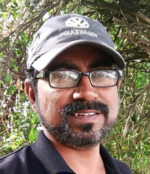TRANSLATED FROM THE HINDI BY MOULINATH GOSWAMI
Bidding Adieu to a City – 3
One day
we shall bathe in Narmada
both of us together.
Narmada emerges from Amarkantak,
we would be thinking, and
even if it did not
we would still be bathing together, and feeling good.
Then we would stand
atop some dry rock… to soak in the sun.
Then we would dress in all our fineries
feast on delicious dishes
indulge in plenty of sweet conversations
settle in an amply beautiful house.
Together we shall have a pleasant sleep
each night, and
we shall lead an abounding splendid life.
Tapti, tell me
if a grisly laughter is spreading across my face?
Bidding Adieu to a City – 4
We are
like the deck of a broken ship
And for the sake of the children
playing atop us
we cannot sink
We have to put up a fight
against the ocean, against the wind
and against possibilities.
Those who watch this
‘life and death’ game of ours
as if it was a stunt show
For whom we are merely a pair of actors
even at our own annihilation
wooden dolls we are
our sympathies, made of wood
For whom
our love seems like a dead rosewood tree,
we have to live
against all their prophecies…
We have to, Tapti.
We shall prove wrong
every solution of their algebra
and rise to the surface
each time.
And on our chests the most beautiful
and the freest of all children
shall play
We won’t sink
never ever, Tapti,
so what if we are
the deck of a broken ship?
Also, read Bidding Adieu to a City (part I & II) by Uday Prakash, translated from The Hindi by Moulinath Goswami, published in The Antonym:
Follow The Antonym’s Facebook page and Instagram account for more content and exciting updates.




























0 Comments